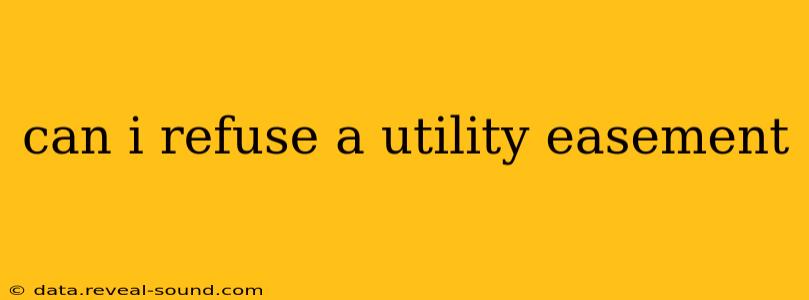Can I Refuse a Utility Easement?
The short answer is: it depends. Whether or not you can refuse a utility easement hinges on several factors, including your location, the type of easement, and the existing laws and regulations. While you might have grounds to negotiate or challenge the easement, outright refusal isn't always an option, and attempting to do so could have significant legal repercussions. Let's break down the complexities.
What is a Utility Easement?
A utility easement is a legal right granted to a utility company (like electricity, gas, water, or telecommunications providers) to access your property for the purpose of installing, maintaining, and repairing their infrastructure. This could involve things like power lines, gas pipes, water mains, or fiber optic cables. The easement doesn't transfer ownership of your land; it simply grants limited access rights. These rights are typically documented in a legal agreement.
What are my rights if a utility company wants an easement on my property?
You have several rights to consider:
-
The Right to Negotiate: You can negotiate the terms of the easement. This might include the location of the utility lines, the compensation you receive, and the limitations on the utility company's access. A skilled negotiator can often secure better terms than those initially proposed.
-
The Right to Due Process: Before a utility company can force an easement, they usually must follow specific legal procedures, which vary by jurisdiction. This may involve public hearings, notifications, and opportunities for you to voice your concerns and objections.
-
The Right to Legal Counsel: If you're unsure about your rights or the terms of the proposed easement, it's highly recommended to consult with a real estate attorney specializing in property rights and easements. They can advise you on your options and represent your interests during negotiations or legal proceedings.
-
The Right to Compensation: In many cases, utility companies are required to compensate you for the easement. The amount of compensation varies depending on several factors, including the size of the easement, the impact on your property value, and local regulations.
Can a utility company force me to grant an easement?
In some situations, yes. This often happens through the process of eminent domain, which allows the government (or a utility company acting with government authorization) to take private property for public use. However, even with eminent domain, you're entitled to "just compensation" for the taking of your property. This means you'll receive fair market value for the easement.
What if I refuse to grant a utility easement and the utility company proceeds anyway?
This is where legal action becomes crucial. If a utility company attempts to install infrastructure on your property without your permission and without proper legal authorization, you can take legal action to stop them. However, fighting an easement granted under proper legal procedure can be expensive and time-consuming, and you may ultimately lose.
What are the implications of refusing a utility easement?
Refusing a utility easement can have significant implications, potentially including:
- Legal Disputes: You may face legal action from the utility company.
- Delayed or Blocked Development: If the easement is necessary for a project impacting your property (or the wider area), your refusal could delay or prevent that project.
- Financial Penalties: In some jurisdictions, you may face fines or other penalties for obstructing a utility's work.
How can I learn more about my specific situation?
It's critical to understand the laws and regulations in your specific location. Consulting with a real estate lawyer experienced in easement disputes is the best way to determine your rights and options. They can review the proposed easement agreement, explain the legal processes involved, and advise you on the best course of action.
Disclaimer: This information is for educational purposes only and should not be considered legal advice. Always seek the advice of a qualified attorney regarding your specific situation.
